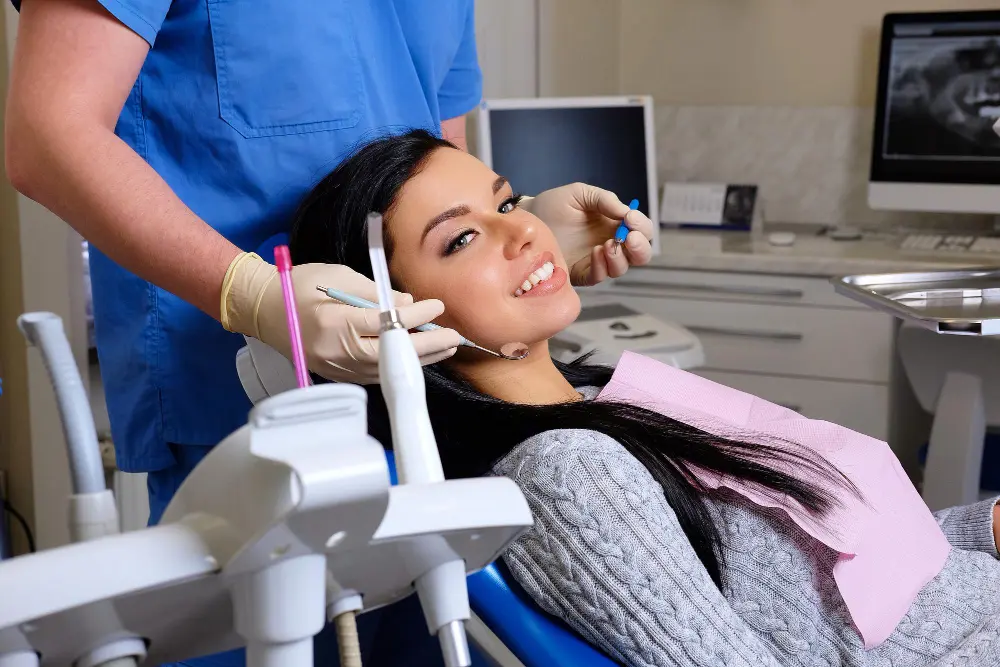Dental anxiety is a common problem, affecting millions of people worldwide. The very thought of a dentist’s drill can trigger feelings of fear, sweat, and even panic attacks. But what if there was a way to turn those anxious visits into relaxed and comfortable experiences? Enter sedation dentistry, your secret weapon against dental fear.
What is Sedation Dentistry?
Sedation dentistry utilizes medication to induce a state of relaxation during your dental procedure. The level of sedation can vary depending on your needs and anxiety level. Here are the three main types of it:
Minimal sedation, also known as inhalation sedation or happy gas, involves inhaling nitrous oxide, a colorless gas with a slightly sweet smell. It produces a light and euphoric feeling, helping you feel relaxed and comfortable during your appointment. You will remain conscious and responsive throughout the procedure, able to communicate with your dentist and respond to requests. Minimal sedation is a good option for patients with mild anxiety or those who simply want to feel more relaxed during routine dental procedures.
Moderate sedation utilizes medication to achieve a deeper state of relaxation. This can be administered orally, through a pill, or intravenously (IV) through a vein. With moderate sedation, you’ll be conscious but in a deeply relaxed state. You may feel drowsy and have little memory of the procedure itself. Moderate sedation is suitable for patients with moderate anxiety or those undergoing slightly more complex procedures.
Deep sedation, also known as sleep dentistry, is the strongest form of sedation dentistry. It leaves you in a sleep-like state with minimal awareness of your surroundings. You might not respond to verbal cues and may only react to physical stimulation. Deep sedation is typically reserved for patients with severe dental phobia or those undergoing very complex or lengthy procedures.
Benefits of Sedation Dentistry
Sedation dentistry offers a multitude of benefits for those struggling with dental anxiety:
- Reduced Anxiety and Fear: The calming effects of sedation significantly reduce feelings of fear and apprehension during your dental visit.
- Increased Comfort and Relaxation: Sedation allows you to relax and feel comfortable throughout the procedure, eliminating any discomfort or tension.
- Improved Ability to Tolerate Longer Procedures: With sedation, you’ll be able to tolerate longer and more complex dental procedures without feeling overwhelmed.
Who is a Candidate for Sedation Dentistry?
It can be a great option for a variety of patients, including:

Individuals Who Struggle with Dental Fear or Anxiety
If the thought of the dentist triggers intense fear or panic attacks, sedation dentistry can be a lifesaver. It provides a safe and manageable way for people with dental phobias to receive necessary dental care. They can finally overcome their anxieties and achieve a healthy smile.
Patients with Sensitive Teeth or a Strong Gag Reflex
For patients with sensitive teeth or a strong gag reflex, dental procedures can be particularly uncomfortable. It can significantly minimize discomfort and allow the dentist to work more efficiently. This can make a huge difference in the overall experience for these patients.
Those Undergoing Complex Dental Procedures
Sedation can be incredibly helpful for individuals undergoing lengthy or complex dental procedures. With sedation, they can relax and remain comfortable throughout the entire process, ensuring a more positive dental experience.
Safety Considerations of Sedation Dentistry
While it is a safe and effective procedure, it’s crucial to consider safety aspects. Choosing a qualified dentist experienced in administering sedation dentistry is paramount. Throughout the procedure, your dentist will closely monitor your vital signs, ensuring your safety and well-being. As with any medication, sedation can have some side effects like drowsiness or grogginess. Be sure to discuss any potential risks or side effects with your dentist beforehand.
Conclusion
Dental fear shouldn’t prevent you from receiving essential dental care. Sedation dentistry offers a powerful solution, turning anxious visits into relaxed and comfortable experiences. Don’t hesitate to discuss sedation options with your dentist and take control of your dental health without fear.
Sedation Dentistry FAQs
What is sedation dentistry?
It uses medication to help you relax during your dental procedure. The level of sedation can vary depending on your needs and anxiety level. There are three main types: minimal (laughing gas), moderate (oral or IV medication), and deep (sleep dentistry).
Is sedation dentistry right for me?
If you experience dental anxiety, have sensitive teeth, a strong gag reflex, or require complex procedures, it could be a great option. Discuss it with your dentist to determine the best approach for your needs.
What are the benefits of sedation dentistry?
It offers several benefits, including reduced anxiety and fear, increased comfort and relaxation, and improved ability to tolerate longer procedures.
Is sedation dentistry safe?
It is safe when administered by a qualified dentist experienced in sedation techniques. Your dentist will monitor your vital signs throughout the procedure, and potential side effects like drowsiness are usually mild and temporary.
What should I expect after sedation dentistry?
Depending on the level of sedation, you may feel drowsy or groggy after the procedure. You’ll likely need someone to drive you home and supervise you for a while. Discuss post-operative instructions with your dentist beforehand.
